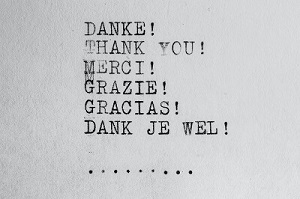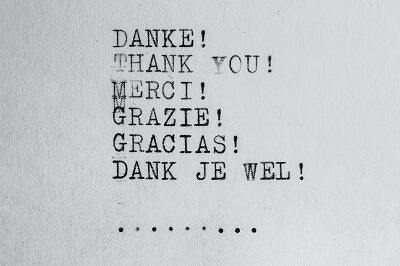Expressing gratitude for having something ‘well-received’ is an essential part of business and communication etiquette, so it’s important to know the most appropriate way to thank someone for a positive reception.

Saying ‘well-received with thanks’ is typically a polite, formal, and gracious way of acknowledging appreciation in a professional setting. This simple phrase communicates that you are thankful for being accepted, welcome, or understood; especially when responding in a constructive and professional manner to criticism or feedback.
Additionally, it can help build rapport between two people when done properly, since it displays an appreciation of the other party’s effort and input on a particular matter. When used strategically and thoughtfully, the phrase ‘well received with thanks’ can foster an atmosphere of understanding and cooperation between individuals.
What is the difference between “well received” and “received well”?
The distinction between “well received” and “received well” may seem small, but it makes a big difference in overall meaning. To receive something well means to be sincerely pleased or gratified by it, so if someone is saying that someone else was “received well,” they are emphasizing the recipient’s delight at being given something valuable.
On the other hand, when something is “well received,” the stress is on how the object was accepted; a good reaction from the recipient is assumed or implied. For example, if a speaker delivers a presentation and their audience reacts positively, then it can be said that the speaker’s talk was “well received.”
While one phrase emphasizes reaction and acceptance, the other focuses a bit more on appreciation and contentment – differentiating between these two similar-sounding terms helps convey more precise outcomes when writing or speaking.
How to use “well-received” in a sentence
Using the phrase “well-received” in a sentence is simple and straightforward, as long as you follow the correct syntax. The phrase should usually be left as a standalone adverb, meaning that it should be placed just before the verb it qualifies.
For instance, if someone had recently announced that they would be hosting another social gathering, a friend may respond by saying “That was well received with thanks.” Here, the phrase modifies the verb “was,” preceding it.
However, note that this works because “received” is an intransitive verb–if used with an active verb, the phrase would require further modification and could potentially sound awkward or incorrect depending on context.
For example, “The speech was well-received by audience members” employs a hyphen to clarify past-participle usage.
Examples of how to use “well-received”
Using the term “well-received” is an effective way to display appreciation and recognition. For instance, in a small business, you could thank someone for doing a good job on a project, saying “Your efforts have been well-received.” This conveys the message that their work has garnered a good reaction or positive feedback and has been appreciated by others or accepted by the intended party.
You could also use it to compliment strategies or approaches, saying something like “Your ideas have been well-received by the team” which indicates that all of those involved support and approve of them.
Furthermore, if you wanted to praise someone for their behavior in other ways, you might say something such as “Your kindness has been well-received by the community” indicating that people not only recognize it but really appreciate it. Above all, using the term in any context serves as a way to express gratitude and commendation.
The importance of using the right words when thanking someone
Expressing gratitude is an important part of building strong connections with those around us. It’s a universal way to show appreciation and affection, no matter what language we speak. That is why it is essential to use the right words when thanking someone.
The language and expressions we choose should be thoughtful and sincere, conveying our deepest sincerity to the recipient. The perfect words can truly be powerful in expressing genuine gratitude—often making all the difference between a formal, polite response and one that is heartfelt and meaningful.
Not taking the time to find the exact words may prevent us from establishing deeper relationships with those closest to us, so it pays off to put thought and care into them.
With effort and practice, anyone can craft creative phrases that convey true appreciation in unique ways that will definitely not go unnoticed.
Is it correct to say well received?
The phrase “well-received” is a somewhat ambiguous part of our language vernacular, but can certainly make sense when used in the correct context. Generally, this expression denotes that a particular idea, concept, or opinion has been met with favor or appreciation by others.
This can be applied to any number of situations including formal introductions at a party or presentation of an argument before another person or persons. It implies to the sender that the recipient has taken it seriously and appreciated the effort put forth.
The phrase is typically used when describing reactions to something, whether it be physical, spoken, or written words.
For example, if one were to take it upon themselves to write a book and after its publication, they are pleased to hear that it was “well-received” by other interested people in their industry or reading group, for example, then they could take a bit of comfort in knowing their hard work was validated by others.
What’s another way to say well received?
Well received is a polite way of describing feedback that has been positive, and therefore could be another way of saying “appreciated”.
Perhaps the most common substitute to say someone or something was well received is “warmly welcomed”; this suggests not only that the person who is arriving somewhere had a pleasant experience, but also that they’ve settled in without difficulty.
This expression can be used in a number of scenarios when talking about people or projects having been favorably accepted by others.
Additionally, other terms could include “positively met”, which similarly carries the message that those receiving the person or entity were happy with what they experienced. To sum up, when someone or something is well received, it’s likely to have been warmly welcomed or positively met.
Conclusion
Gratitude for a ‘well-received’ gesture is a crucial aspect of business correspondence and email etiquette, therefore it’s necessary to know how to express your appreciation in the most fitting and proper way.
Using the phrase “well-received with thanks” in business emails is a pleasant and proper approach to expressing gratitude in a business context. If you’re responding positively to criticism or comments, this short sentence might convey your appreciation for being heard and understood.
When done correctly, showing appreciation for the other party’s effort and involvement on a topic can also assist establish rapport between the two parties involved. The phrase “well welcomed with thanks” can pave the way for future mutual respect and cooperation if used judiciously and with good intentions.

Sophie Hammond is a journalist, psychologist, and freelance speechwriter for people in politics and business. She lives on the edge of the Rocky Mountains with her dog and a lifetime supply of books. When she’s not writing, she can be found wandering through nature or journaling at a coffee shop.

